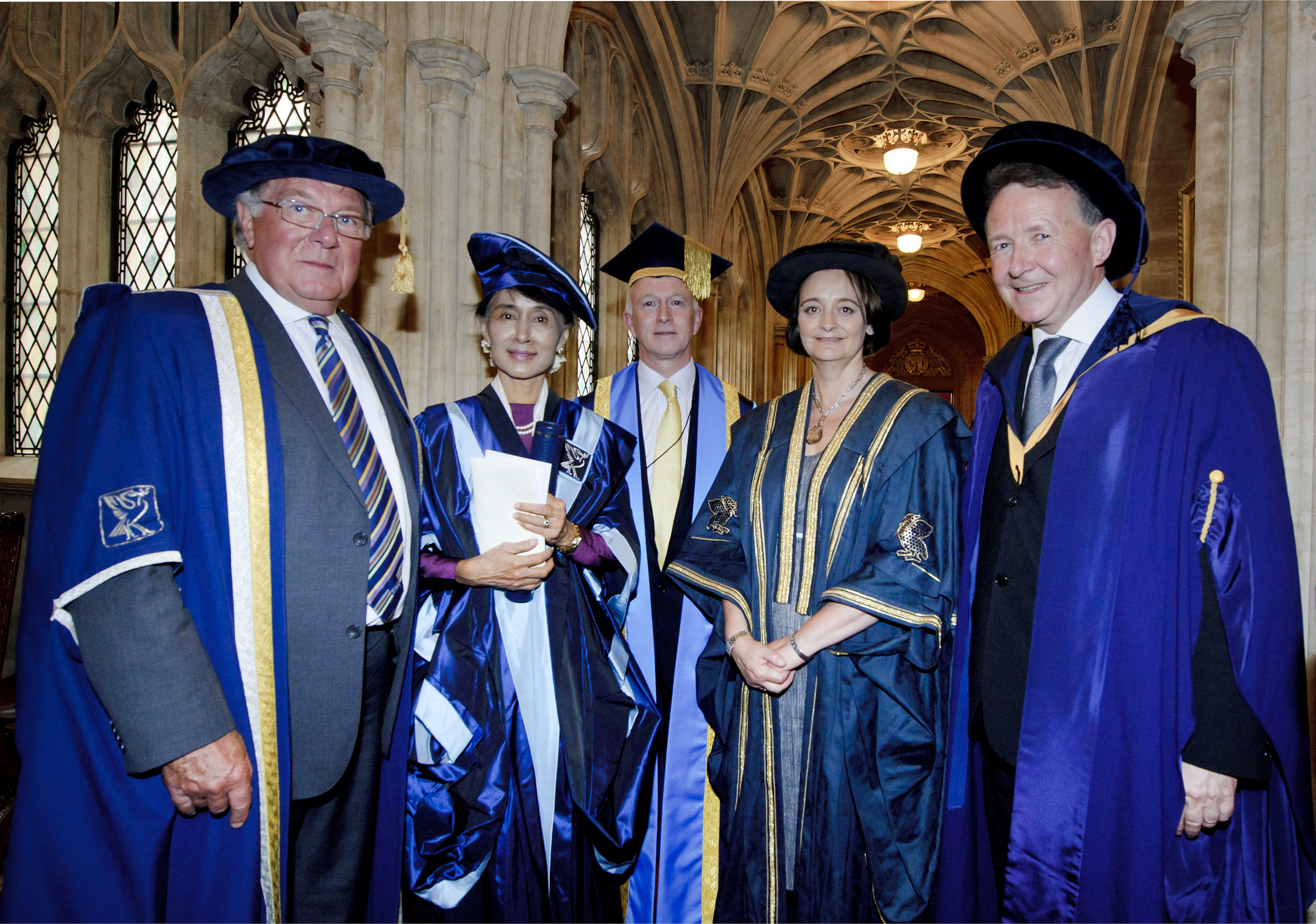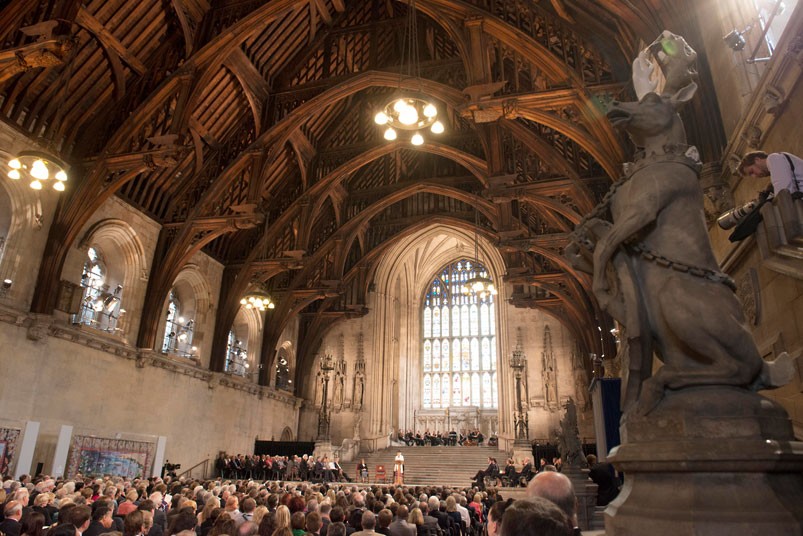
Daw Aung San Suu Kyi receives Honorary Fellowship from Former LJMU Chancellor Cherie Booth and LJMU Vice-Chancellor Professor Nigel Weatherill.
Pictured: Chair of LJMU’s Board of Governors Sir Malcolm Thornton, LJMU Honorary Fellow Daw Aung San Suu Kyi, LJMU Vice-Chancellor Professor Nigel Weatherill, Former LJMU Chancellor Cherie Booth and Director of LJMU’s Foundation for Citizenship, David Alton (Professor Lord Alton of Liverpool).
Catherine Bebbington/Parliamentary Copyright:Parliament
Aung San Suu Kyi will be in Britain this week.
http://conservativehome.blogs.com/platform/2012/06/aung-san-suu-kyis-visit-marks-a-potential-turning-point-not-a-conclusion.html
22 June 2012
Daw Aung San Suu Kyi, Burma’s pro-democracy leader, received her Honorary Fellowship from Liverpool John Moores University on Thursday 21 June at the House of Commons, Westminster. Awarded in 2009, in recognition of her ‘contribution to the strengthening of democracy and human rights’, it was originally received on Aung San Suu Kyi’s behalf by her sister-in-law, Mrs Lucinda Phillips.
The Fellowship was presented to Aung San Suu Kyi at the House of Commons by former LJMU Chancellor Cherie Booth and LJMU Vice-Chancellor, Professor Nigel Weatherill.
The recipient of numerous international awards, Aung San Suu Kyi graduated from the University of Oxford in 1967, holding a degree in philosophy, politics and economics. She has become an international symbol of peaceful resistance in the face of oppression, and became the leader of Burma’s pro-democracy movement whenshe returned to the country in 1988, initially to look after her sick mother.
Aung San Suu Kyi has spent most of the last two decades in some form of detention because of her efforts to bring democracy to military-ruled Burma. In 1991, a year after her National League for Democracy (NLD) won an overwhelming victory in an election the junta later nullified, she was awarded the Nobel Peace Prize. She was sidelined for Burma’s first elections in two decades on 7 November 2010 but released from house arrest six days later.
LJMU’s Director of the Foundation for Citizenship, David Alton (Professor Lord Alton of Liverpool) said:
“Daw Aung San Suu Kyi’s approach to life and her admirable fortitude, dignity and courage, are an inspiration to all who study her life. Her belief is that all people should be allowed to realise their full potential which is at the heart of LJMU’s approach to education. Much still needs to happen in Burma – including the release of 600 political prisoners still in jail – but Aung San Suu Kyi’s personal courage and bravery, recognised in the LJMU Fellowship, gives hope for the country’s future and is transforming what appeared to be an intractable and hopeless situation.â€
Honorary Fellowships are given in recognition of outstanding achievement by an individual in a given field or profession and to those who exemplify LJMU’s ethos to ‘dream, plan and achieve.’
———————————————————————————————————
In 2009, before an audience of 1000 people in Liverpool’s St.George’s Hall, her sister-in=law, lucinda philips. received an honorary fellowship from liverpool John Moores University on her behalf: Citation for an Honorary Fellowship: Aung San Suu Kyi delivered by Prof. Lord Alton of Liverpool.
May 6th 2009.
Vice Chancellor and distinguished guests, it is a great privilege this evening to begin our proceedings by reading a citation for the admission of Daw Aung San Suu Kyi for admission as an honorary fellow of Liverpool John Moores University.
For 13 years and 194 days Dr. Suu Kyi has been under house arrest in Burma and, in enforced absentia, her academic award will be received on her behalf by Mrs. Lucinda Phillips, Aung San Suu Kyi’s sister-in-law.
We warmly welcome Mrs. Phillips here to St. George’s Hall tonight.
Just over a year ago in this same hall, during the week we remembered victims of holocaust, genocide and crimes against humanity, Pascal Khoo Thwee, a former student leader in Burma and author of “From the Land of the Green Ghosts” delivered a Roscoe Lecture.
He reminded us of the cruel suffering of the Burmese people at the hands of the military junta, of the fate of the ethnic minorities, such as the Karen, the suffering of the political dissidents , the suppression of free speech, the closure of the universities, and the crushing of the democratic movement personified by the imprisonment and continued house arrest of Aung San Suu Kyi.
Having myself been illegally into the Karen State, and visited Karen refugee camps, I have seen first hand and taken witness statements from some of those who have experienced torture, injury,the deaths of loved ones, rape, imprisonment, and forced labour as part of the genocidal campaign waged against the ethnic minorities of Burma.
Pascal Khoo Three’s lecture came just weeks after the crushing of the 2007 protest by Buddhist monks, students and democracy activists when the world watched as peaceful protest was brutally suppressed.
Just one year ago, on May 2nd, Burma was devastated by Cyclone Nargis, causing at least 146,000 fatalities and, according to the United Nations, 1.5 million Burmese people being made homeless or severely affected. The Military Junta was conspicuous in it is failure to mount adequate relief operations or to respond effectively or compassionately to the suffering of Burma’s people.
Throughout all of this, the daughter of General Aung San, the father of modern-day Burma, has remained the face of hope and compassion for her people: an icon for those who cherish human rights and democratic values and oppose tyranny.
In her own words: “As my father’s daughter, I felt I had a duty to get involved….The people of Burma are like prisoners in their own country, deprived of all freedom under military rule.” Aung San Suu Kyi experiences the suffering of her people on a daily basis.
Born in Rangoon in 1945, Aung San Suu Kyi is not permitted to see her family or her friends: visitors are banned. Her phone line is cut and her post intercepted.
In 1990 her National League for Democracy (NLD) won the elections but instead of becoming Prime Minister the military placed her under house arrest. She is now serving her third term of house arrest. This term began in May 2003 after the regime’s militia attacked her convoy and killed up to 100 of her supporters. She responded by reiterating her belief in Gandhian principles of non-violence.
Aung San Suu Kyi graduated at the University of Oxford in 1967, holding a degree in philosophy, politics and economics. In 1990 she was elected as an Honorary Fellow of Oxford University.
In 1972 she married Dr. Michael Aris, an Oxford scholar, and they had two children, Alexander and Kim.
In 1988 she returned to Burma to look after her sick mother and began her campaign for democratic change – speaking before half a million people in Rangoon and forming the NLD. The following year she was placed under house arrest.
During the years of suffering and pain that have followed, and at great cost to herself, this extraordinarily courageous Buddhist woman has steadfastly defied tyranny. When her husband was diagnosed with cancer the junta refused him permission to travel to Burma and Aung San Suu Kyi never again saw Michael, who died in 1999.
Her courage has been recognised all over the world and she is the recipient of numerous international awards.
In 1991 she was awarded the Nobel Peace Prize. The Norwegian Nobel Committee said: “She has become an important symbol in the struggle for democracy…Suu Kyi’s struggle is one of the most extraordinary examples of civil courage in recent decades.” In 2007 the US House or Representatives voted unanimously – 400-0 – to award the Congressional Gold Medal and the Senate concurred. She has been made an honorary citizen of Canada and has received the freedom of the city of Dublin along with numerous other civic and academic awards.
One of her most famous speeches is entitled “Freedom From Fear”. In it she says: “It is not power that corrupts, but fear. Fear of losing power corrupts those who wield it and fear of the scourge of power corrupts those who are subject to it.”She also says “Our struggle for democracy is a struggle for our everyday life. Human beings the world over need freedom and security that they may be able to realise their full potential.”That belief in allowing human beings to realise their full potential is at the heart of Liverpool John Moores University’s approach to education.
It is why the university established its Foundation for Citizenship: to help every citizen realise their full potential as citizens.
During this year when our Roscoe lectures examine the theme of tyranny and how citizens might best respond to totalitarianism, it is also timely and appropriate that the Academic Board have sanctioned this recommendation.
Vice Chancellor, Daw Aung San Suu Kyi’s approach to life and her admirable fortitude, dignity and courage, are an inspiration to all her study her life. It is with great pleasure that I present her to you for admission as a fellow of Liverpool John Moores University.
———————————————————————————————————
During this historice 2012 visit to Britain it is vital to remember the continued suffering in Burma:Human Rights Watch estimated in 2002 there to be an approximate total of 70,000 children and young people remain involved in the State and ethnic armies of Burma.
Amnesty International point out that 600 political prisonersd remain in Burmese jails and say: Aung San Suu Kyi is due to set foot in the UK for the first time in 24 years this week. She comes not just as a free woman, but also as an elected MP and recognised national leader. This is in no small part down to the commitment of Burmese activists, Amnesty supporters and others who tirelessly campaigned for her release. However, despite encouraging changes taking place in the country and an amnesty for over 650 political prisoners since May 2011, hundreds of other prisoners of conscience remain behind bars. Amnesty International is calling for all remaining political prisoners to be released.
You can access this briefing on line – please feel free to share and tweet – at http://www.amnesty.org/en/library/asset/ASA16/003/2012/en/62cc4319-a779-4c9e-93c8-0a3945203411/asa160032012en.pdf and find more information on our call for all political prisoners to be released here: http://action.amnesty.org.uk/ea-action/action?ea.client.id=1194&ea.campaign.id=15309#action


